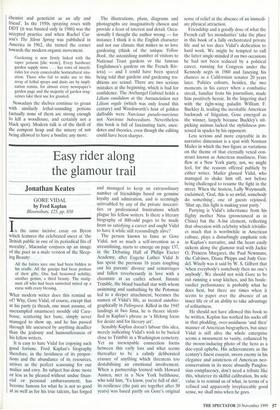Easy rider along the glamour trail
Jonathan Keates
GORE VIDAL by Fred Kaplan Bloomsbury, £25, pp. 850
In the same incisive essay on Byron which features the celebrated sneer at 'the British public in one of its periodical fits of morality', Macaulay conjures up an image of the poet as a male version of the Sleep- ing Beauty:
All the fairies save one had been bidden to his cradle. All the gossips had been profuse of their gifts. One had bestowed nobility, another genius, a third beauty. The malig- nant elf who had been uninvited mixed up a curse with every blessing.
What modern writer does this remind us of? Why, Gore Vidal, of course, except that at his party (a thrash, one must assume, of unexampled smartness) mouldy old Cara- bosse, scattering her bane, simply never managed to show up, and he has passed through life uncursed by anything deadlier than the jealousy and humourlessness of his fellow writers.
It is easy to hate Vidal for enjoying such good fortune. Fred Kaplan's biography therefore, in the lavishness of its propor- tions and the abundance of its resources, arrives as the perfect seasoning for our malice and envy. Its subject has done more or less as he pleased without undue finan- cial or personal embarrassment, has become famous for what he is not so good at as well as for his true talents, has forged and managed to keep an extraordinary number of friendships based on genuine loyalty and admiration, and is seemingly untroubled by any of the private insecuri- ties or professional frustrations which plague his fellow writers. Is there a literary biography of 800-odd pages to be made from so satisfying a career and ought Vidal to have it while still resoundingly alive?
The person known to fame as Gore Vidal, not so much a self-invention as a streamlining, starts to emerge on page 137, in the Debating Hall of Philips Exeter Academy, after Eugene Luther Vidal Jr has spent the previous 16 years toughing out his parents' divorce and remarriages and fallen reverberantly in love with a classmate at an earlier school. Jimmie Trimble, the blond baseball star with whom swimming and sunbathing by the Potomac led to a deeper attachment, becomes the numen of Vidal's life, as treated autobio- graphically in Palimpsest. Killed in the 1945 landings at Iwo Jima, he is thence identi- fied in Kaplan's phrase as 'a lifelong focus for desire and for literary art'.
Sensibly Kaplan doesn't labour this idea, merely indicating Vidal's wish to be buried close to Trimble in a Washington cemetery. Yet an inescapable connection forms between this early loss and what seems thereafter to be a calmly deliberated erasure of anything which threatens too destabilising an emotional involvement. When a partnership formed with Howard Austen, met in a New York bathhouse, who told him, `Ya know, you're full of shit', its resilience (the pair are together after 50 years) was based partly on Gore's original sense of relief at the absence of an immedi- ate physical attraction.
Friendship and a goodly dose of what the French call 'les mondanites' take the place in this book of a fully orchestrated private life and so too does Vidal's dedication to hard work. We might be tempted to call the latter single-minded if on two occasions he had not been seduced by a political career, running for Congress under the Kennedy aegis in 1960 and fancying his chances as a Californian senator 20 years later. Politics colours, besides, the two moments in his career when a combative streak, familiar from his journalism, made him positively heroic. In the lingering duel with the right-wing paladin William F. Buckley Jr, trailing the inevitable American backwash of litigation, Gore emerged as the winner, largely because Bucldey's nit- picking animus lacked the stylishness pos- sessed in spades by his opponent.
Less serious and more enjoyable in its narrative dimension is a spat with Norman Mailer in which the two figure as variations on the theme of that eternally vexed con- struct known as American manliness. Fists flew at a New York party, not, we might feel, for the reasons offered publicly by either writer. Mailer glassed Vidal, who managed to shake him off, not before being challenged to resume the fight in the street. When the hostess, Lally Weymouth, exclaimed, 'God, this is so awful, somebody do something', one of guests rejoined, `Shut up, this fight is making your party.'
Partying is Vidal's inheritance from his flighty mother Nina (pronounced as in China) but the A-list element, reflecting that obsession with celebrity which trivialis- es much that is worthwhile in American culture, plays a disturbingly emphatic role in Kaplan's narrative, and the heart easily sickens along the glamour trail with Jackie 0, Princess Margaret, the Paul Newmans, the Calvinos, Diana Phipps and Judy Gen- del. Wisely was it said by W. S. Gilbert that 'when everybody's somebody then no one's anybody'. We should not wish Gore to be out running a soup kitchen, and his boule- vardier performance is probably what he does best, but there are times when it seems to paper over the absence of an inner life or of an ability to take advantage of solitariness.
He should not have allowed this book to be written. Kaplan has worked his socks off in that plodding, over-assiduous 'and then' manner of American biographers, but since Vidal is still alive the whole enterprise seems a monument to vanity, enhanced by the swoon-inducing photo of the hero as a doe-eyed ephebe. His achievements as the century's finest essayist, sworn enemy in his elegance and astuteness of American neo- conservatism in its more absurdly Panglos- sian complacency, don't need a tribute like this, whatever its skilful calibration. Its sole value is to remind us of what, in terms of a refined and apparently irreplaceable good sense, we shall miss when he goes.


























































































 Previous page
Previous page